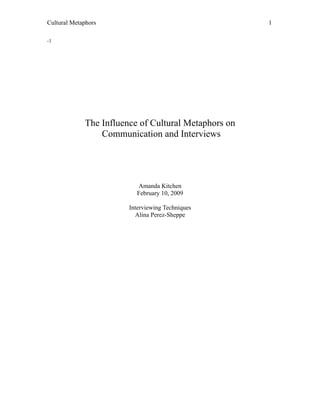
Cultural metaphors
- 1. Cultural Metaphors 1 -1 The Influence of Cultural Metaphors on Communication and Interviews Amanda Kitchen February 10, 2009 Interviewing Techniques Alina Perez-Sheppe
- 2. Cultural Metaphors 2 In my home, we were raised mostly by a single mother who was always trying to teach us that life is hard at times, and the best thing you can do is learn how to deal with it. One of the metaphors we often heard was “Life has a tendency to come back and bite you in the butt.” In other words no matter how good things are they can always turn around and start going wrong. Nothing is guaranteed and with joy comes a certain and expected amount of pain. Another often used metaphor was, “Once your heart has been broken it grows back bigger.” My mom always said in accordance with this that you never truly learn how to love until you have been hurt. You have to love unselfishly, as a mother loves her child. When your heart is broken for the first time, it feels destroyed. When the broken pieces begin to mend, they grow back into a stronger and bigger heart more capable of loving and giving. The metaphors of my childhood are not singular to my culture. Although the language is different, many other cultures have these same ideals in their own families and lives. Camelia Frunza, a Romanian and English translator says, “Human cultures are all alike in furnishing sets of systemized answers to the universal problems of human existence, but the answers are all deferent answers, and each culture is therefore unique.” (Frunza) In fact the historical experience of the Romanians as farmers, shephards, fisherman, and handicraftsmen have many of the same cultural metaphors that are modern today in society more focused on enjoyment of self. “To call a spade a spade”, “To get steamed up”, and “To beat around the bush”, are metaphorical expressions that are bred from this culture, and if we have not used them we have all heard them. Metaphors are useful as teaching tools for children and adults across cultures and at home. They hold a universal truth that is relevant to everyone. In interviews they
- 3. Cultural Metaphors 3 would help to let a person you are not familiar with feel comfortable. In a way through use of this specific language, you and your interviewee can find some common ground. REFERENCE Translating Culture- Specific Metaphoric Expressions. Frunza, Camelia. 07/11/2005. Retrieved on 02/09/09 from www. Proz.com.